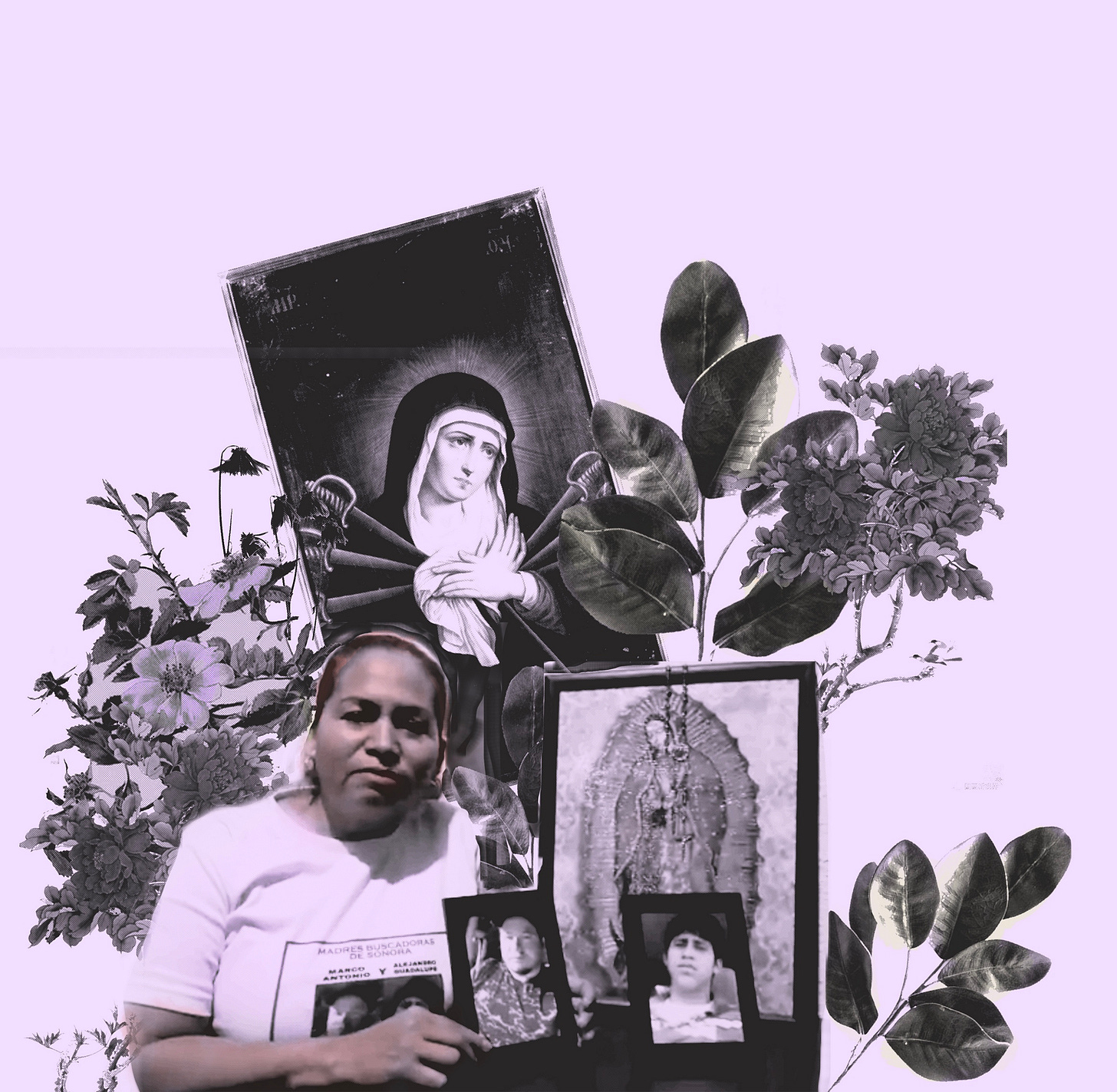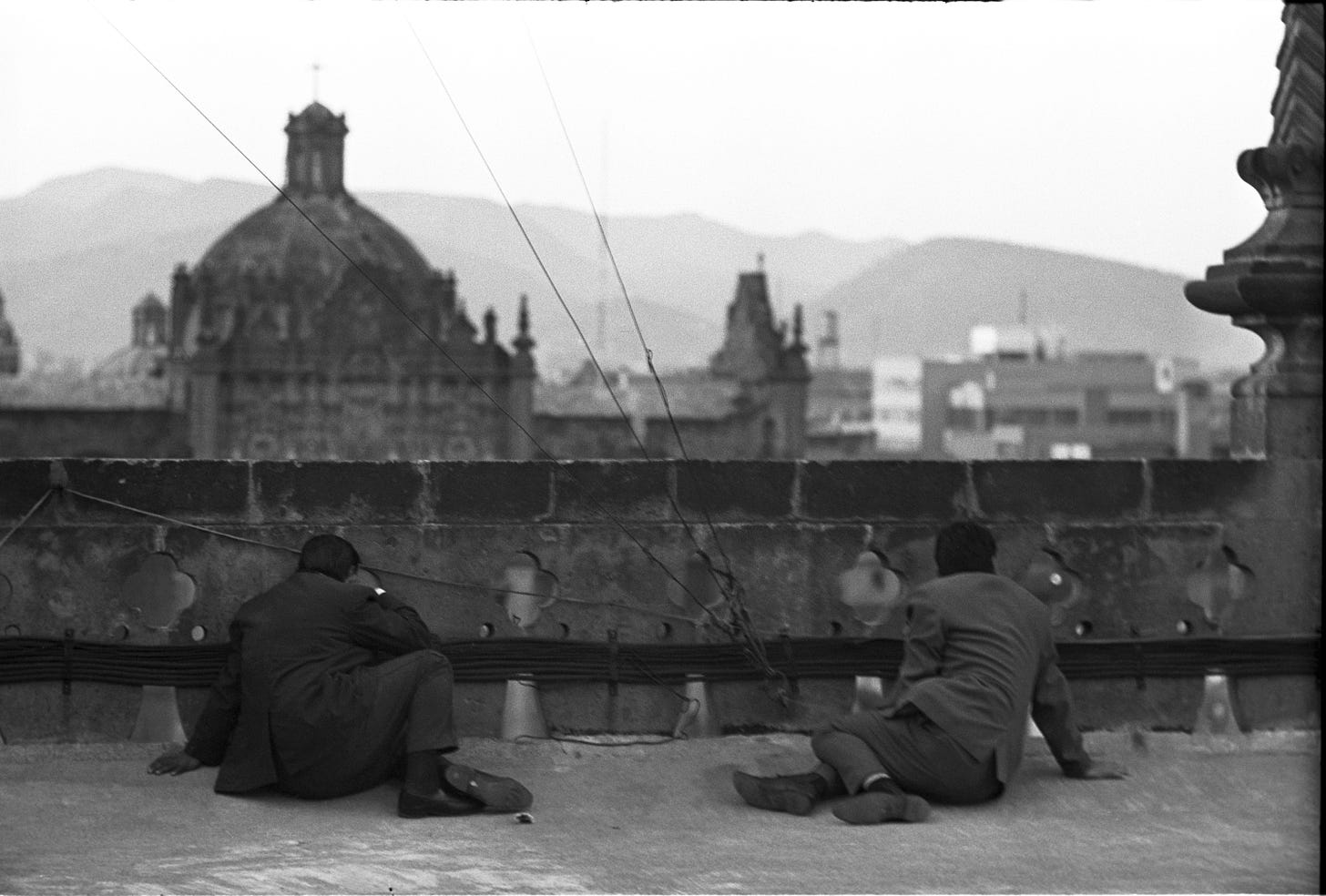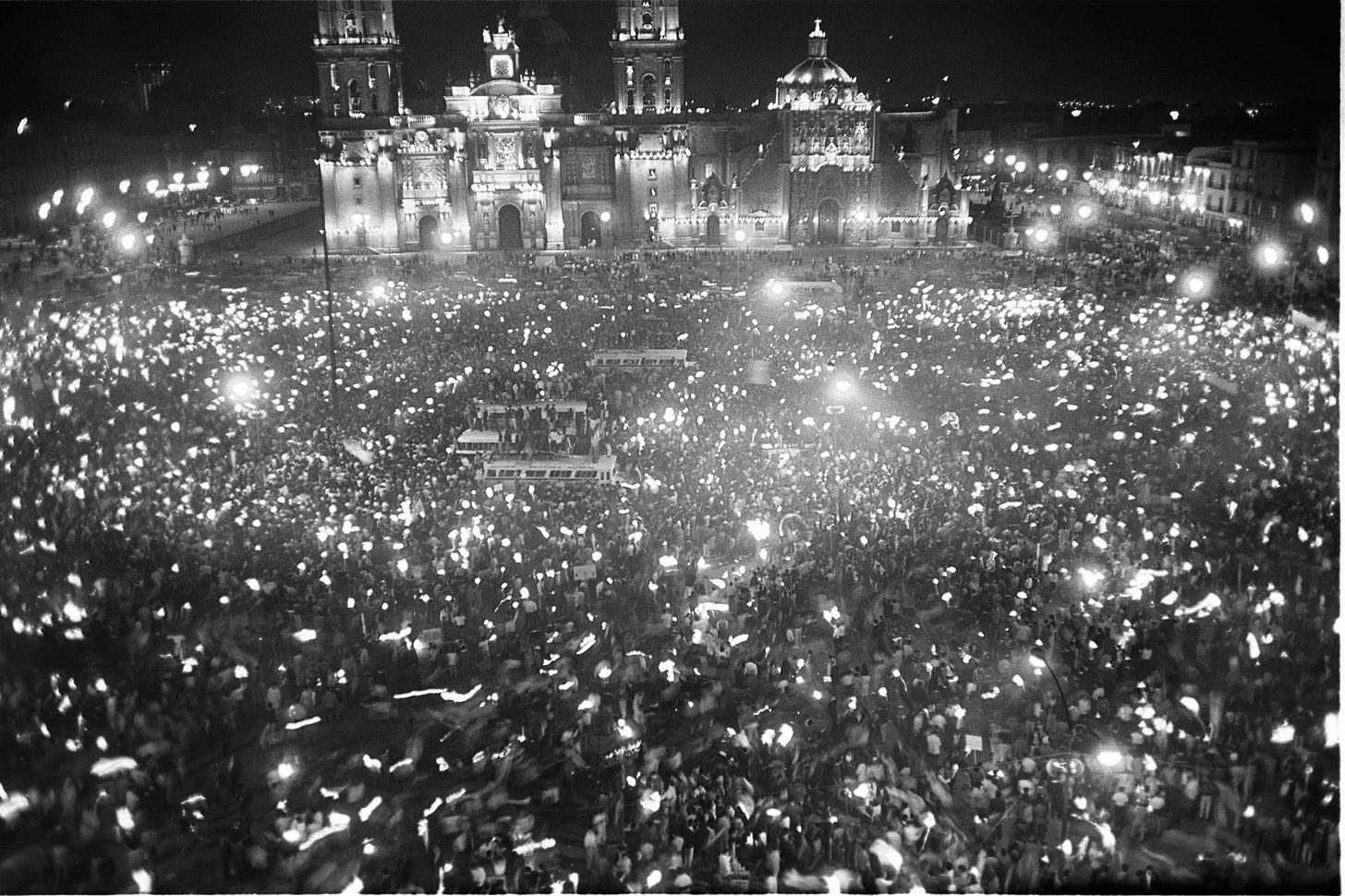The State of grief
While the complicit Mexican State obstructs and furthers their grief, the Mothers Searching for the Forcibly Disappeared communally seek answers. Yesterday, they recovered the bodies of 70 victims.
While the complicit Mexican State obstructs and furthers their grief, the Mothers Searching for the Forcibly Disappeared seek answers communally.
Their story is a courageous example of mutual aid and direct action despite living in a state of grief.
Yesterday, they retrieved the bodies of 70 disappeared victims from 221 black bags filled with human remains during their first mission in the state of Jalisco.
«We are mothers, friends, sisters, daughters, aunts – of a missing part of our lives. We are learning to live with this…»

The State of Grief
From 2006 to 2016 in Mexico, State authorities reported the discovery of 1,978 mass graves, and the Office of the Mexican Attorney-General, another 232.
Twenty-four State prosecutor offices acknowledged that in their territory, clandestine burials containing, at least, 2,884 bodies were found. It is not possible to know the exact scale of this atrocity1.
“Be very careful with these groups that come from I-don't-know-where to do I-don't-know-what; I asked the specialized Prosecutor's Office and the Search Commission to be very careful, because then these types of actions — done in good faith — by the families… might have other sorts of hidden agendas that we don’t know about", stated recently the governor of Jalisco, Enrique Alfaro, while referring to the communal search groups that conduct the exhausting tasks to locate missing persons, as reported by taller ahuehuete’s comrade and collaborator, Heriberto Paredes.
Alfaro, the State authority just cited, communicated the veiled suspicions the apparatus manifests specifically to these collectives, which, in coordination with local communities conduct long days of continuous searching, as it has been the case for several years now in different regions throughout the entire nation-state of Mexico.
Heriberto reported in his recent article, “The Politics of Silence and Deceit”, how the work not carried out by the Prosecutors' Offices, District Attorney Offices and other State Committees of Public Investigation is done instead by the families themselves; in this way, they trace a geography different from the bureaucratic one. A geography of the struggle for answers. One of solidarity, mutual aid, and direct action with the ultimate goal of uncovering the truth regarding the whereabouts of their collective, missing loved ones.
Cecilia
For the vast majority of government entities, the search for missing persons is not even a feigned priority. In fact, it is not a problem they perceive relevant enough to be addressed seriously or comprehensively with resolute measures, even if for the sake of theatricality.
Like Enrique Alfaro, other representatives of the Mexican State display unfortunate performances that reinforce the air of inexorability in the current scenario: the lack of results, the impunity. Where are the missing persons?
«The Mexican government's policy is one of silence and deceit; it is based on the denial of the deep crisis reflected in the almost 99,000 people who have officially gone missing»
For bureaucratic institutions, the search cooperatives are always up to something, hiding something — always serving obscure motives.
Cecilia Patricia Flores, member of the collective Madres Buscadoras de Sonora, after a meeting with the politician Enrique Alfaro himself, generously declared to the media:
«the governor assured that the doors of Jalisco will always be open for the search collectives, it was useful that he listened to us…»
Regardless, the investigative task is relegated to the victims by the State. It is worth mentioning that Jalisco holds the highest official number of missing persons: more than 15,000 according to official data; however, it is estimated by the collectives that this figure could have already exceeded 30,000 victims if basing it on concrete events and not State-sanctioned statistics.
Cecilia2, in a brief two-minute video published on January 2, 2022, addressed the highest-ranking drug lords of her state directly:
«The need to organize this collective emerged the moment I saw the disregard the State authorities gave to the search for my son. It was the great need to bring him home what initiated this cooperative.
I have been threatened, and I have been displaced from the state of Sonora […] I was displaced from Sonora, they tied my hands and feet, taking away the possibility of continuing to search for my son, and all the disappeared persons.»
Cecilia addressed the cartels by the end of her 9:12 a.m. video-message:
«I have to continue searching for my children — which is why I feel the need to ask you, the heads of the Sonora cartels, Salazar and Caro Quintero and other cartel leaders: do not to kill us, do not abduct us, do not threaten us.
Please, let us continue searching for our children. We are not looking for guilty parties, we are not looking for justice, the only thing we want is to bring them back home!»
Although the phenomenon of forced disappearances in Latin America has been widely studied, the issue has been the assumption that all victims subject to the practice of enforced disappearances are or have been “politically active — in short, that those who are deemed ‘subversive’ are singled out” by the state apparatus, thus becoming targets of “the terrorizing violence of the State” writes Dawn Marie Paley3. Furthermore,
«Reading [the phenomenon of] forced disappearances through this lens traps us in Cold War logic. Not only does it fail to account for contemporary disappearances in Mexico and elsewhere, but it hinders our ability to understand disappearance as a key element.
The rise of abductions on a massive scale in Mexico has disproportionately affected the people made members of the country’s relative surplus population»
«Keeping this in mind allows us to read this horrific pattern as a contributor to a kind of social control measure, useful to both capital and the State» the author added4.

Authority, the first obstacle
Laura Orozco from Michoacán, with three disappeared relatives, trusted to Heriberto Paredes:
«If only we had known that the disappearances were really a State policy — that they were really backed by the institutions themselves — we would have understood the urgency of filing our complaint immediately to prevent evidence from being lost, to prevent witnesses from leaving the area.
It is important to understand what is happening politically behind the disappearances in order to advance in these judicial processes»
One of the common denominators in all the investigations has been the slowness of the authorities responsible for initiating the search, said Heriberto.
The re-victimizing rhetoric, with phrases such as «surely they were up to no good» or «she is not missing, she probably just eloped with her boyfriend» are the most commonly heard.
After sharing their experience in common, relatives have been able, collectively, to overcome this first obstacle by recognizing this tactic as a bureaucratic norm, almost part of an unofficial checklist. For the communities, opening up and sharing despite the experienced vulnerability has spared them from more emotional wounds, preventing them from falling for this bait, and instead empowered them to pursue their own investigations.
After the analysis of more than 50 interviews, another frequent sentiment focused on the request that the different public offices impose on the families: they were told to stay still, to not to do anything, to not join the search collectives because it would be counterproductive for their own records.
In addition, in many cases, the Public Prosecutors’ Offices did not file the claim in time, or refused to carry out the procedures, until, precisely with the support of other individuals who were actively searching, it became possible to file the complaint.
«Unfortunately, the government is in charge of looking for the crime — so it searches you as a family before searching for the disappeared person. It makes a spectacle of your whole life, questioning everything in your past; who you associate with, what you do, what you don't do, and above all to women, they’re particularly scrutinizing. It is women who are re-victimized more often than men»
"I suppose that the legal route is one of the most important [alternatives] for us, not only because you demand that the authorities do the job they are supposed to do, but also because at the international level one could expose this whole pattern of systemic impunity in Mexico” declared Laura Orozco. “One of the things that can be done is this public form of communication, so that people know what is happening, so that it doesn’t stay a local tragedy; this could help deter this violence. We must make use of this tool5".

The Why and Who
The present economic system produces, along with the accumulation of capital for some, a superfluous group of humans.
Superfluous, that is, for the eyes of capital. This, what some refer to as the “relative surplus population6” exists in every possible form. The category is conformed by every person only partially employed or wholly unemployed, or working under the shadows of the “illegal” labor markets7. A society like ours, based on wage-labour, can only express itself in a scarcity of jobs, and what appears as evergreen forms of precarious employment emerging like mushrooms after the rain.
The majority of the disappeared victims are not part of the Mexican elite class. Although not coalesced into a single homogeneous group, they generally belong to vulnerable populations, such as migrants in transit to the US; those experiencing poverty, not participant in the “regulated” wage-labor market8; they are often originary peoples, expropriated or in the process of expropriation by transnational capital eager to extract natural resources from their land, to sell as commodities.
In and through the cyclical crises of our present system, “the general law of capital accumulation suggests that, over time, more and more workers and capital will find that they are unable to reinsert themselves into the reproduction process. In this way the proletariat becomes an externality to the process of its own reproduction, a class of workers who are free not only of means of reproduction, but also of work itself” succinctly described9 Aaron Benanav and John Clegg.
For Leigh Payne, the standard concept of ‘enforced disappearance’ is not applicable to these contemporary tragedies. The term, in its classic form, was helpful for addressing the incidents that plagued the Shoah, and the events inflicted by authoritarian regimes.
Payne presented four arguments to explain the present atrocity: its clandestine nature; the construction of a ‘disposable’ person; the political economy usefulness; and the ambiguity of the loss as a form of social control10.
Forced disappearances indicate the trivialization of everyday violence. They have ceased to be the exclusive prerogative of State agents acting on politically motivated grounds. For Carolina Robledo11, to better understand the phenomenon, it is necessary to consider not only the direct responsibility of the State, but the investigative omission of the bureaucratic bodies.
Scholars recognized in Mexico a pattern by locating two periods plagued with mass disappearances: the ongoing War on Drugs — a militarization policy enacted by conservative ex-president Felipe Calderón, started by his predecessor, the conservative populist Vicente Fox12 — and the Dirty War («guerra sucia»), a contiguous panorama, for Mexico, during the Cold War.
The Dirty War was characterized by a wave of violence and suppression against leftist students, workers and dissidents inflicted by the PRI-regime under anti-communist presidencies13 and, naturally, backed by the eager US government, never not omnipresent in Abya Yala. However, most of the research regarding the subject focused on the politically motivated suppression-by-abduction accounts in the nation-states of Argentina, Chile, Guatemala and El Salvador.
“Not surprisingly, the place that the ‘dirty war’ occupies in the collective memory, both in Latin America and Mexico itself, is only marginal. The Mexican Dirty War is a somewhat forgotten event, both in Mexican and international conflict recollection. For the families of the disappeared, however, it is quite the opposite of a forgotten era14” outlined Sylvia Karl.
The militarized ‘war on drugs’ (December 11, 2006 – present) prominently figuring the ex-president Felipe Calderón, resulted in what is described as a crisis of disappearances.
Scholars15 argue that the main objective of the violence and heightened levels of militarization deployed in the war on drugs was not, in fact — as claimed by the political apparatus16 — the aim to combat drug-trafficking and the illegal labor-market, but the exertion of social control over the population and over the territory in order to guarantee the expansion of transnational capital.
For Dawn Paley, “the fight against crime and drugs serves as a pretext, appealing to national security, to deploy forms of violence that weaken the strength of multiple community practices of struggle and resistance.” These practices, to the logic of the system, represent “barriers to capitalist accumulation and expansion in the midst of the intense dispute over material wealth.”
While the Mexican Dirty War of the past century considered as counterinsurgent any ideological opposition, the present war is characterized by an indiscriminate target: those unfortunate to reside “in a territory coveted by capital, become an obstacle to accumulation.”
Paley emphasized the territorial quality of the current crisis, referring to “spatial pattern of violence”.
«If, during the 1970s, State-sponsored violence paved the way for the implementation of neoliberalism, today, the State-crime assemblage guarantees capitalist expansion and accumulation in the global regime»
In other words, an ‘administrative disappearance’, cooperation between capital and its lapdog, the State.
Mutual aid and direct action
Despite the uphill battle, plagued by threats, harassment, violence, obstruction and grief, the search continues. The women say they seek treasures, and avoid talking about corpses or the dead.
“Since 2015, we became aware that we would never have access to justice. We were threatened, humiliated, treated as criminals. They said that my son was probably involved in something bad. Far from investigating who took my son, first they investigated us; when they realized I had no connection to the field of “organized crime”, they did not take the necessary measures, they said 'time had passed'; because everything has a time limit: for the cameras, the videos — the evidence expires” shared Guadalupe17 Rodríguez, in her last interview18, to Heriberto Paredes.
«When I saw the negligence, when I saw the arrogance of the prosecutors, of all the prosecutors' offices — because my case involved several branches of the State Prosecutor General Office — I felt the need to gather with other people.
At first there were only 5 or 6 of us, so we started to spread the word.
I started to give out my phone number and they would call me and ask me questions. I told them that the only objective was to find our disappeared, to know who committed the crime. We started to get together and from there we grew until we had 100 families, mothers, fathers, children and siblings. We are more than 500 people in the collective, and more are joining every day.
I accompany the families so that they can be appointed their legal advisor, so that the mothers do not walk alone.»
In Sonora, search groups work daily to locate approximately 4,000 people (according to official data) and, as seen in their social networks, thousands of human remains and extermination sites have been located.
“It is not only the search in mass graves: there is the search for life. We belong to the country-wide search brigade. Once you start, nobody can stop you. I cannot search in my land, but I will search for other people, to give a little bit of peace to others. Returning a treasure — as we call the missing loved one — is to feel a little bit of peace. I would like to be the person to whom they give a body, to whom they return a skeleton, remains, whatever they want to call them” expressed Marité Valadez19.
"Among all of us there is less fear, we become one," commented Victoria Paz, a tracker.
María Teresa Valadez, 52, declared resolutely:
«Since the State does nothing, I became an investigator.»
one thing i’ve learned / come to a provisional conclusion about:
when it comes to fighting, there are people who will help you
fight & there are people who will not & there are people
who will stand in the way. find the people who will help / be loud
& clear so they know where you are — focus on them, be encouraged
by them, encourage them, work with them. don’t worry
about the people who won’t help. they will be of no help even
if they are on your side. waste as little energy as possible
fighting people who stand in the way, which is to say don’t talk
don’t argue, just get them out of the way of the fight you came for.
tl;dr: you don’t need or want
the people who you know
aren’t “with you” to be
with you. really, you don’t









